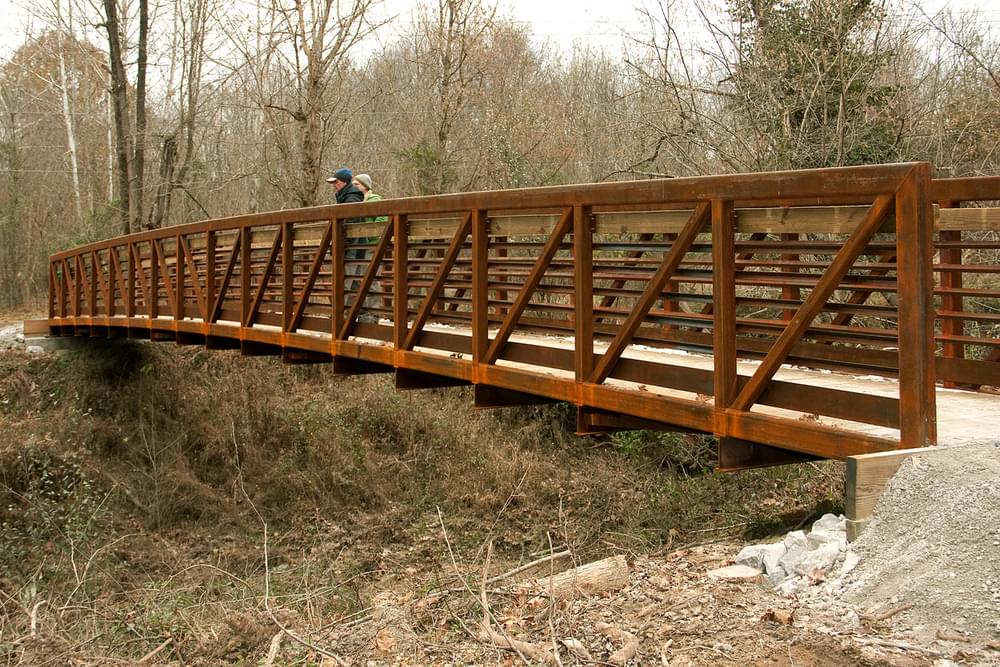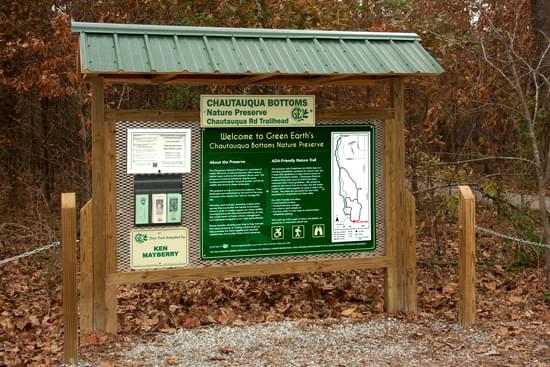
Accessibility Enhancement
Chautauqua Bottoms Accessibility Upgrades

This project realized two major landmark accomplishments for our organization: Constructing an ADA-friendly multiple-use trail that mitigated the challenges of wet bottomland trails and erecting an 80-foot pedestrian bridge over Little Crab Orchard Creek that connects the western and eastern portions of the preserves and its three trail systems.
Green Earth, Incorporated is a small 501(c)(3) not-for-profit land conservancy based in Carbondale, Illinois. Since 1974, our mission is to preserve natural areas for the benefit of the people of the Carbondale area. We own and maintain six natural areas, totaling 220 acres, and nine miles of hiking trails – all open to the public for outdoor recreation and enjoyment. In 2015, Green Earth was awarded funds by the Recreational Trails Program to improve the trails at our second largest property, the Chautauqua Bottoms Preserve. This project realized two major landmark accomplishments for our organization: Constructing an ADA-friendly multiple-use trail that mitigated the challenges of wet bottomland trails and erecting an 80-foot pedestrian bridge over Little Crab Orchard Creek that connects the western and eastern portions of the preserves and its three trail systems. These upgrades now provide year-round access to a greater portion of our community and have been very well received. The wide, hard-surfaced trails invite the mobility challenged, elderly, children, families, cyclists and dog-walkers to explore the wonder and beauty of Carbondale’s natural history.
The project was funded utilizing a $102,000 award from the Illinois Department of Natural Resources’ Recreational Trails Program and $32,150 in match secured by Green Earth. GE solicited $11,650 from our supporters, and Carbondale Township awarded GE $25,500 towards the project. The Illinois Clean Energy Community Foundation funded $5,000 of trailhead amenities upgrades that brought improvements to all three of the Chautauqua Bottoms trailheads. These amenities included stone benches, bike racks, trash and recycling receptacles, information kiosks and signage. Our volunteers also played a big part in making this long-standing pipe dream a reality. Southern Illinois University students, community members, professionals, and GE board members alike lent their time and talents in the planning, implementation and maintenance phases of this project. Joe Lenzini, Operations Manager for E.T. Simonds Construction Company, donated much of his services on the project, and E.T. Simonds Construction performed the project at cost, forgoing profit. Since this collaboration, E.T. Simonds has provided yard space for storage of trail maintenance materials at their Carbondale facility. The late fluvial geomorphologist Steve Gough provided services crucial to the difficult task of placing the 80-foot pedestrian bridge pro bono.
The original David Kenney Trail and portions of the Maurice Webb Trail were often wet and muddy, with portions seasonally inundated in ankle-deep water and mud. This resulted in the need for specialized footwear and exceptional balance to navigate trails, leaving these sections of the preserve accessible to only a hardy few for several months out of the year. Even when trails were dry, they were often terribly uneven from ruts made by foot traffic through the muddy sections. Conditions were unfit for anyone with limited mobility, cyclists and dog-lovers wanting to come home with a clean pet.
Groundbreaking of this project began in the spring of 2018 with the expansion of the parking lot at the Chautauqua Street Trailhead and installation of new trailhead amenities at the Chautauqua, Freeman and Sunset Trailheads. In the summer of that same year, construction of the ADA-friendly trail commenced. On October 30th of 2018, an 80-foot weathered-steel pedestrian bridge was placed over Little Crab Orchard Creek by E.T. Simonds Construction Company, connecting the David Kenney and Maurice Webb Trails. In addition to the 80-foot pedestrian bridge, three smaller 6-foot-wide bridges with handrails were constructed on the David Kenny Trail with the help of Habitat for Humanity and a local boy scout attaining his Eagle rank. By November, the majority of the trail construction was completed, and three open houses were held to introduce the community to the new upgrades. Due to delays from poor soil conditions associated with seasonal weather, the final trail improvements were completed in the summer of 2019.
Upon completion of the upgrades, the preserve saw marked and steady increases in visitors. Now that wetland hydrology and soil conditions no longer limit the accessibility of the preserve and quality of the recreational experience, record numbers of visitors are using the preserve year-round. Volunteers working on the preserves have counted upward of 100 visitors in a single day, easily eclipsing weekly visitation totals before the upgrades. The demographics of our visitors changed as well, with significant increases in youth and senior visitation. These upgrades have also attracted record numbers of cyclist and dog-walkers. To minimize conflicts between the user groups, signage regarding right-of-way and trail etiquette have been installed throughout the trail system.
Though the upgrades were immediately well-received and increased the preserve’s exposure to the community, the new-and-improved Chautauqua Bottoms Preserve became a bright spot for many during the COVID-19 pandemic. Social isolation brought many new visitors to Chautauqua Bottoms and supporters to Green Earth. The ADA-friendly upgrades became a refuge for a community seeking safe spaces to recreate, exercise, and seek the comfort of nature. This additional patronage has allowed Green Earth to maintain strong fundraising efforts during a time of great economic uncertainty. Our wide, hardened-surface trail and well-maintained corridors allowed visitors to maintain social distancing guidelines. In addition, all visitors were required to wear a mask to minimize the risk of COVID-19 transmission.
Ongoing maintenance will be funded by donations from our supporters, future grant opportunities and proceeds from our biannual plant sale and annual Pumpkin Glow fundraisers. We often only need to cover the costs of materials and logistics for projects since we perform most of the work with volunteers from our board and of the community. Green Earth holds a volunteer workday every third Saturday of the month that rotates among the preserves and focuses on trail and habitat maintenance. We also host student and community groups for special projects throughout the year. These helping hands are guided by a well-seasoned core group of volunteers and dedicated board members. We also garner much support from our community partners at Southern Illinois University, City of Carbondale, Carbondale Township, Keep Carbondale Beautiful, Illinois Native Plant Society, Forest Restoration Support Team and others.
Additionally, Green Earth has received multiple grants from the Carbondale Township to purchase large-ticket items that have greatly increased the capacity of our organization to maintain our preserves. In 2019, the Carbondale Township awarded GE $19,000 to purchase the organization’s first official pickup truck, a 2011 GMC Sierra ¾ ton, with upgrades. In 2020, GE was awarded $15,200 to purchase an electric UTV and a heavy-duty trailer for hauling the UTV and gravel for trail work. The Township recently approved another request for a tank sprayer and flail mower to be used with the UTV for vegetation management, and a 12-foot by 20-foot storage shed to house this new equipment. All of this equipment allows us to complete our work in less time, with less effort, and fewer personnel.
The Chautauqua Bottoms Accessibility Upgrades Project has far exceeded our organization’s expectations of providing access to more of our community and getting the public engaged with nature. This is by far the largest and most rewarding project that Green Earth has undertaken in our 47-year history. In a region rich with opportunities for outdoor recreation, we are proud to have one of the few ADA-friendly trails and a more inclusive preserve.
More winners of this award
2023: Danada-Herrick Lake Regional Trail- Cromwell Drive Connector
2020: Boardwalks and Observation Deck Rehab/Replacement
2019: Sassafras Mountain – South Carolina
2018: Camp Creek Greenway - Georgia
2017: Talisi Riverwalk Trail Extension - Alabama
2016: Graber Pond Accessible Trail - Wisconsin
2015: Rotary Park Accessible Trail (Phase 2) - Tennessee
2014: Merrimack County Four-Season Northern Rail Trail - New Hampshire
2013: Beaman Park Accessible and Interpretive Trail - Tennessee
2012: The Children’s Center’s Life Trails and Therapeutic Park - Oklahoma
2011: Potts Memorial Park Trail Project - Missouri
2010: Laurel Fork Trail at Holly River State Park - West Virginia
2009: Southwest Key Trail - Texas
2008: Johnny Henderson Park Trail - Alabama
2008: Trails Accessibility Program - Florida
2007: Penny Lake Trail/Boothbay Harbor - Maine
2006: Springs Valley Trail - Indiana
2005: Trail Access Information for Northern Nevada
2004: Camp ASCCA Environmental Trail - Alabama
2003: Upper Roaring Brook Accessible Walkway and Fishing Pier - Rhode Island


